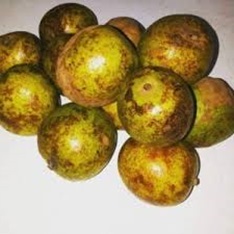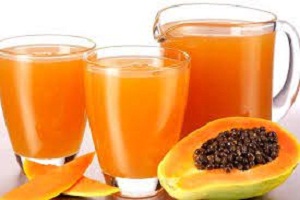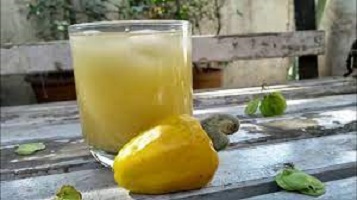Ugiri Fruit: African Bush Mango Health Benefits and Uses
Ugiri Fruit: African Bush Mango Health Benefits and Uses

The African mango tree (Irvingia gabonensis) is indigenous to West Africa, where it thrives in the region’s dense jungles and deciduous forests.
Known also as bush mango, dika nut, or bread tree, this tropical tree produces fruits and seeds that offer numerous health benefits.
In countries like Cameroon and Nigeria, the fruit of the African mango is a dietary staple, appreciated for its high Vitamin C content.
Various parts of the tree, including its roots, seeds, leaves, and bark, have been utilized in alternative medicine for many years.
Recently, African mango extract has emerged as a popular weight loss supplement in the United States. This extract, obtained from the nut or seed of the fruit, is believed to assist in weight management. Some research indicates that African mango may also help address chronic conditions such as diabetes and high cholesterol.
Despite the growing interest in African mango supplements, more clinical trials are necessary to validate these health claims.
Health Benefits of Ugiri Fruit
- Weight Management
Appetite Suppression: Extracts from the seeds of the African bush mango, often marketed as Irvingia gabonensis, have been shown to help suppress appetite, which can be beneficial for weight loss.
Improved Metabolism: The fruit extract can enhance metabolism, aiding in weight loss and management.
- Cholesterol Reduction
Lower LDL Levels: Studies have indicated that Ugiri fruit can help reduce low-density lipoprotein (LDL) cholesterol levels.
Increase HDL Levels: It may also help increase high-density lipoprotein (HDL) cholesterol, contributing to better heart health.
- Blood Sugar Regulation
Improved Insulin Sensitivity: The fiber and other compounds in Ugiri fruit can improve insulin sensitivity, making it beneficial for individuals with diabetes or those at risk of developing the condition.
- Digestive Health
High Fiber Content: The fruit is rich in dietary fiber, which aids in digestion and helps prevent constipation.
- Antioxidant Properties
Rich in Vitamins and Minerals: Ugiri fruit contains vitamins C and E, which are potent antioxidants that protect the body from oxidative stress and inflammation.
Ugiri Fruit and Pregnancy
Ugiri fruit, also known as African pear or Dacryodes edulis, is a tropical fruit commonly found in West and Central Africa. When it comes to pregnancy, here are some considerations regarding the consumption of ugiri fruit:
Nutritional Benefits
Rich in Nutrients: Ugiri fruit contains essential vitamins such as vitamin C, which is important for the immune system, and vitamin E, which acts as an antioxidant. It also contains minerals like potassium and calcium, which are crucial for maintaining healthy bodily functions.
- Healthy Fats: The fruit is a good source of monounsaturated and polyunsaturated fats, which are beneficial for heart health and can support the development of the baby’s brain and nervous system.
- Fiber Content: Ugiri fruit is high in dietary fiber, which can help in maintaining digestive health and preventing constipation, a common issue during pregnancy.
Safety Considerations
Moderation: As with any food, it is important to consume ugiri fruit in moderation. Overeating can lead to excessive calorie intake and potential digestive issues.
- Allergies: Ensure you are not allergic to ugiri fruit. If you have never consumed it before, it is advisable to start with a small amount to check for any adverse reactions.
- Quality and Freshness: Always consume fresh and properly washed fruits to avoid any risk of foodborne illnesses, which can be more dangerous during pregnancy.
Potential Benefits during Pregnancy
Nutrient Support: The vitamins and minerals in ugiri fruit can support the increased nutritional needs during pregnancy.
- Digestive Health: The fiber content helps in maintaining regular bowel movements, reducing the risk of constipation.
- Energy Boost: The healthy fats and natural sugars in ugiri fruit can provide a quick energy boost, which can be beneficial for pregnant women dealing with fatigue.
General Advice
Consult your healthcare provider: It is always best to discuss any dietary changes or the introduction of new foods with your healthcare provider, especially during pregnancy.
Balanced Diet: Ensure that ugiri fruit is part of a balanced diet that includes a variety of fruits, vegetables, proteins, and whole grains to meet the nutritional needs during pregnancy.
In conclusion, ugiri fruit can be a healthy addition to a pregnancy diet when consumed in moderation and as part of a balanced diet. Always consult with your healthcare provider for personalized advice.
Ugiri Fruit has anti-inflammatory Effects
Reduce Inflammation: The presence of anti-inflammatory compounds in the fruit can help reduce inflammation in the body, potentially alleviating symptoms of conditions like arthritis.
Ugiri Fruit Nutritional Value
A 100-gram serving of African mango fruit, including both the pulp and peel, contains the following nutrients:
- Calories: 86
- Protein: 1 gram
- Carbohydrates: 18 grams
- Fat: 0.4 grams
- Vitamin C: 62% of the Daily Value (DV)
Most weight loss supplements derived from African mango use fruit seed extracts.
The seed is rich in soluble fiber and provides essential nutrients such as healthy fatty acids and plant proteins.
Additionally, it contains significant amounts of iron, riboflavin, calcium, sodium, phosphorus, and magnesium.
Research has identified 41 phenolic compounds in African mango seeds, including tannins, flavonols, and ellagic acid.
These compounds serve as potent antioxidants, helping to eliminate harmful free radicals from the body.
Uses of Ugiri Fruit
Culinary Uses:
- Fresh Consumption: The pulp of the Ugiri fruit can be eaten fresh and is enjoyed for its unique flavor.
- Cooking: In West African cuisine, the seeds (known as dika nuts) are often ground and used as a thickening agent in soups and stews.
- Snacks and Juices: The fruit can be processed into various snacks, juices, and other beverages.
Traditional Uses of Ugiri Fruit
West African cultures have utilized various parts of the African mango tree for generations, attributing numerous health benefits to its extracts. These extracts are believed to:
- Increase energy levels
- Suppress appetite
- Boost circulation
- Strengthen bones
- Improve heart health
Because of these unique medicinal properties, African mango extracts are often incorporated into foods and beverages. Traditional applications and believed benefits of the African mango include:
- Firstly, balms and Ointments: are used for topical pain relief.
- Secondly, digestive Aid: Its constipating properties help treat dysentery and diarrhea.
- Thirdly, bark preparations are used to treat hernia.
- Leaf Infusions: Made into tea to treat infections
- Toothache Relief: Soft bark is used to relieve toothaches and mouthwashes.
- Wound Healing: Antimicrobial properties promote the healing of scabs and wounds.
- Food Flavoring: Seeds and their extracts are used as flavoring agents.
- Cooking Oil: Edible oil derived from the seed is used for cooking.
- Lastly, fruit Pulp is used to make jam, jelly, and juices.
Ugiri Fruit Cosmetics and Skincare Uses
Skincare Products: The oil extracted from the seeds is used in cosmetics and skin care products due to its moisturizing and anti-inflammatory properties.
Ugiri Fruit Nutritional Supplements
Dietary Supplements: Extracts from the seeds are available in supplement form and are marketed for their weight loss and metabolic benefits.
Animal Feed
Livestock Feed: The by-products of Ugiri fruit processing are sometimes used as feed for livestock, providing nutritional benefits to animals.
Ugiri Fruit Clinical Benefits
Significant research has been conducted on the effects of African mango extracts, particularly about obesity and body fat percentage.
Animal Studies: Research on rats indicates that African mango oil can reduce abdominal fat and blood glucose levels.
Human Clinical Trials: Studies show that individuals who took African mango seed extract experienced improvements in weight reduction and metabolic parameters.
By the end of these studies, participants had lower body weight, body fat, LDL cholesterol, blood glucose, and plasma total cholesterol.
Other studies suggest that African mango may be effective against diabetes and gastrointestinal disorders.
Extracts from the leaves and roots exhibit powerful antimicrobial properties, inhibiting the activity of bacteria and fungi, making them suitable for antiseptic treatments.
Additionally, a study found that water extract from the African mango stem bark has pain-relieving properties comparable to morphine.
Ugiri Fruit Weight Loss Claims
The weight-loss claims associated with African mango supplements are supported by only a limited number of studies. Most evidence for its fat-burning properties comes from animal research on rats.
Although these preliminary results are promising, more research is necessary to fully understand the effects and mechanisms of African mango in humans.
It’s important to note that the dietary supplement market is largely unregulated. Organizations like the FDA do not oversee the safety of these supplement pills.
Consequently, the actual contents of the pills may differ from what is listed on the packaging.
Additionally, there are no established dosage guidelines for African mango extract supplements.
While many manufacturers recommend taking 150 mg of African mango seed extract twice daily, the optimal dosage may vary for each individual.

Ugiri Fruit Potential Risks and Side Effects
Little is known about the potential interactions between African mango extract and prescription medications. Reported side effects include headaches, constipation, flatulence, and sleep disturbances.
Additionally, some individuals may be allergic or hypersensitive to components of the African mango.
People with chronic health conditions should consult their healthcare providers before using African mangoes for weight loss.
Ugiri Fruit Conclusion
The African bush mango, or Ugiri fruit, offers many health benefits, particularly for weight management, cholesterol reduction, and blood sugar regulation.
Its versatile uses in culinary applications, traditional medicine, cosmetics, and nutritional supplements make it a valuable addition to both diet and wellness routines.
As with any supplement or natural remedy, it is important to consult with a healthcare provider before incorporating it into your routine, especially for those with existing health conditions or those taking other medications.


